There are many flummoxing things about visiting Israel – we’re thinking noise levels, insane driving and our inherent inability to stand in line – but few are as bewildering as taking public transportation around the country.
This has less to do with language barriers or unreliable timetables than with cultural differences and local norms.
To ensure smooth sailing, scroll down below for the essential things you must know before stepping on a bus or train here. Safe travels!
You need an app or a little green card
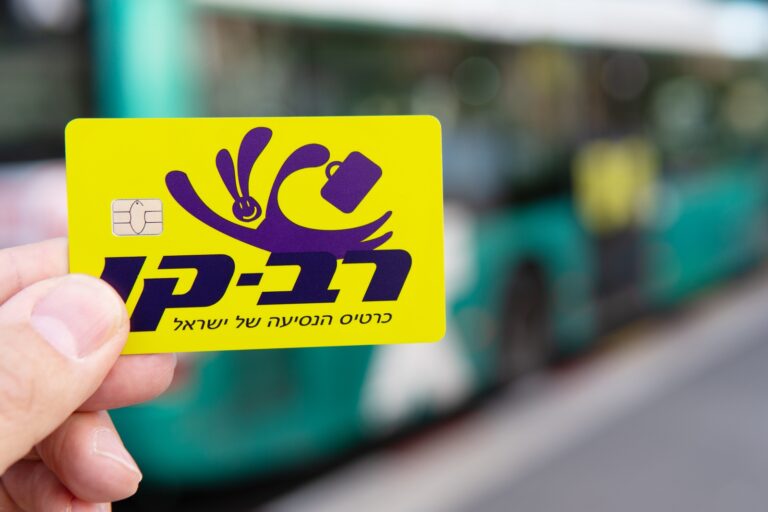
In recent years, Israel has embraced paperless travel. You can pay for your trip via an app that lets you scan a QR code upon boarding a bus or entering a train station.
Or you can get a Rav Kav — a green contactless travel card that you load with money before embarking on your journey. Click here to find out how and where to get your very own Rav Kav.
Jerusalem light rail stations still offer the option of buying a paper ticket at machines on the platform; you must purchase before boarding. Keep it handy for when inspectors come through the carriage. Israel Railways also still accepts paper tickets for a single journey from the station where you bought your ticket.
Bring a jacket, especially in summer

Israeli summers are stifling hot, right? Right. Except on trains and buses, which in an apparent bid to alleviate our suffering crank up the AC to levels that leave even the sweatiest of people shivering. Always carry an extra layer with you, even when it seems counterintuitive. We cannot stress this point enough.
Prepare to get up for others
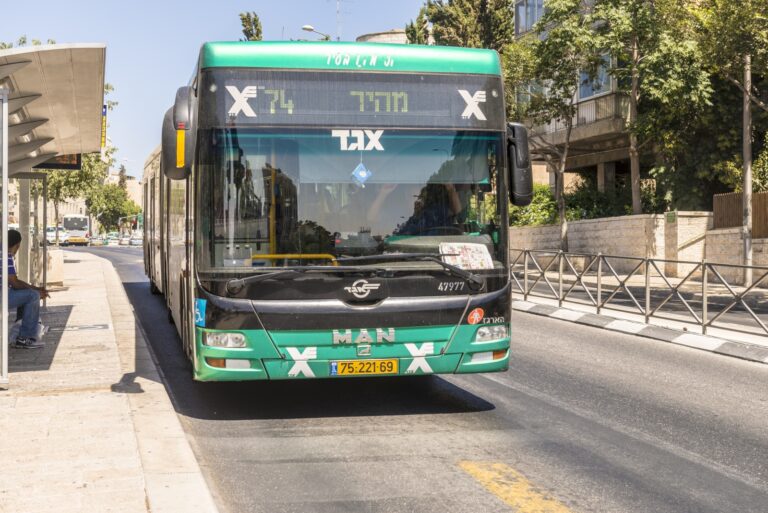
For some reason, Israelis are perceived to be a nation with no manners. A quick hop on the bus will soon dispel you of that notion, when you see riders offering their seats to elderly people, pregnant women or people carrying small children. And while the person being offered the seat might wave the offer away, the other side will always be more persistent.
Hold on for dear life

Israeli bus drivers don’t wait a moment between closing the door and taking off at a speed that would leave Lewis Hamilton reeling. Which is why we highly recommend you either sit down immediately or grab the nearest handle. And in no case should you fiddle around with your wallet unsupported.
We have taxis small and big
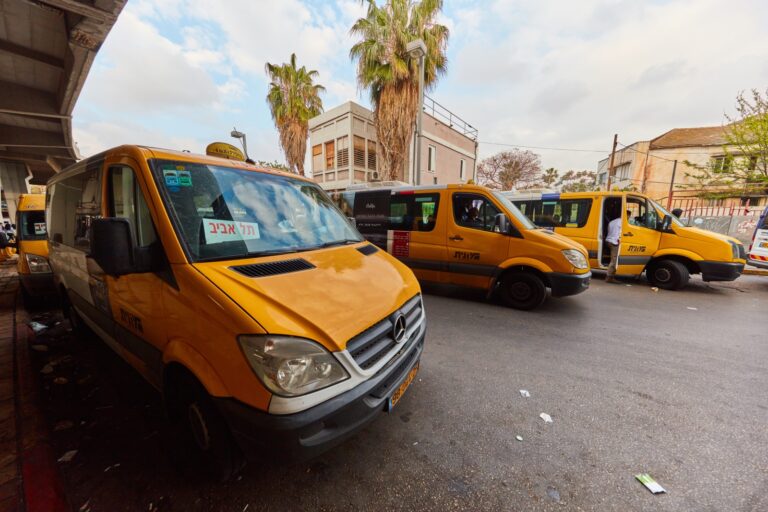
In Israel, we have two types of taxis – big and small. The small ones are regular cabs, endearingly called in Hebrew “special taxi,” which you can flag down or order via app and in which you’re the only passenger.
The bigger taxis are yellow or white minivans called sherut cabs that seat 10 passengers. You flag them and then join others along a predetermined route, hopping off along the way.
Sherut cabs often accept Rav-Kav cards, but cash is still common. Don’t sit at the front, because all the passengers behind you will pass you along the fare for the driver, leaving you feeling like a bank teller.
You’ll get to know your fellow passengers
Israelis, you may have noticed, never speak in hushed tones. This is also true on public transportation, where you will be unable to escape people’s most intimate life details, related to their friends or family on the phone in complete oblivion of their surroundings. And nothing, apparently, is too private for the whole bus to hear – think financial troubles, medical issues and sex lives.
Your neighbors might want to get to know you too

Privacy is not a big thing in Israel, and as such you may find the passenger sitting next to wanting to strike up a conversation about the weather, politics, your appearance or their wonderful grandchildren. Unless they’re too preoccupied with their own phone conversation (see above).
We had to learn to let people off first
When the light rail was introduced to Jerusalem a few years ago, employees in bright yellow vests patrolled the platform, explaining to people that in order for the train to leave the station as quickly as possible one has to let passengers get off the train before embarking. This was quite a revelation to many, and even nowadays there are too many people who apparently never received the memo.
You can ask for directions
Stations are announced automatically but if you’re feeling lost on the bus or didn’t catch the station’s name in Hebrew, fear not. It is perfectly acceptable to tell the driver where you need to get off, and ask to be informed when you reach your destination. And on any form of public transportation, other passengers are always very helpful in helping you get where you need to be.
It’s a microcosm
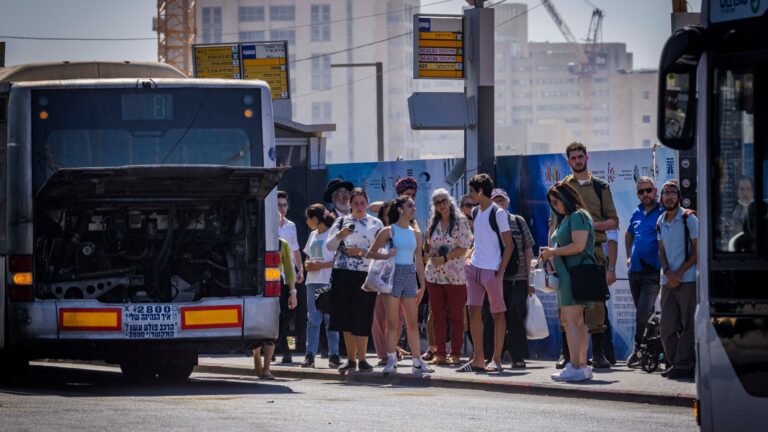
Taking the bus or train in Israel is a perfect way to catch a good glimpse of Israeli society. You’ll be surrounded by Arabs, Jews, religious and secular people, young and old, from all walks of life and backgrounds. A short ride highlights the amazing human mosaic that is us — and noise levels aside, can be quite a heartwarming experience.
Know when to avoid the whole thing
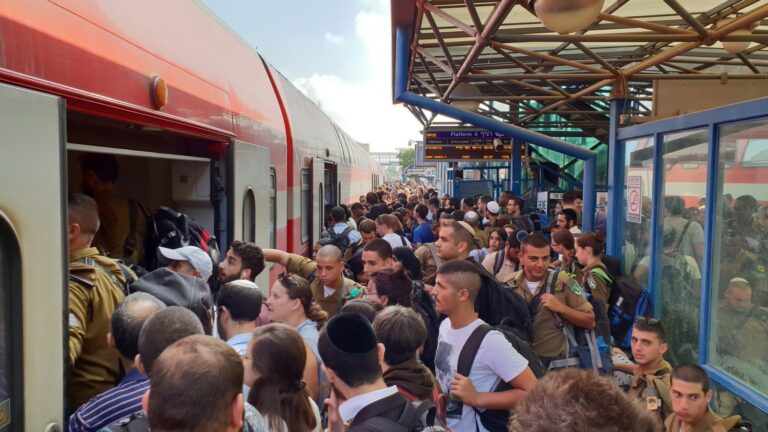
Sundays in Israel are the beginning of the working week (horrific, we know), and that means that rush hour is worse than usual.
A particularly Israeli angle to this madness is the fact that soldiers who were home for the weekend make their way back to base early on Sunday morning, complete with their humongous bags. The same often happens on Thursday, when they leave base to get back home. And by the way, that “getting up for others” tip (#3) also extends to soldiers — Israelis will always encourage a tired soldier to lean back for a quick nap in their stead.
















